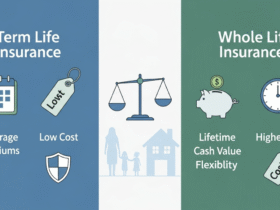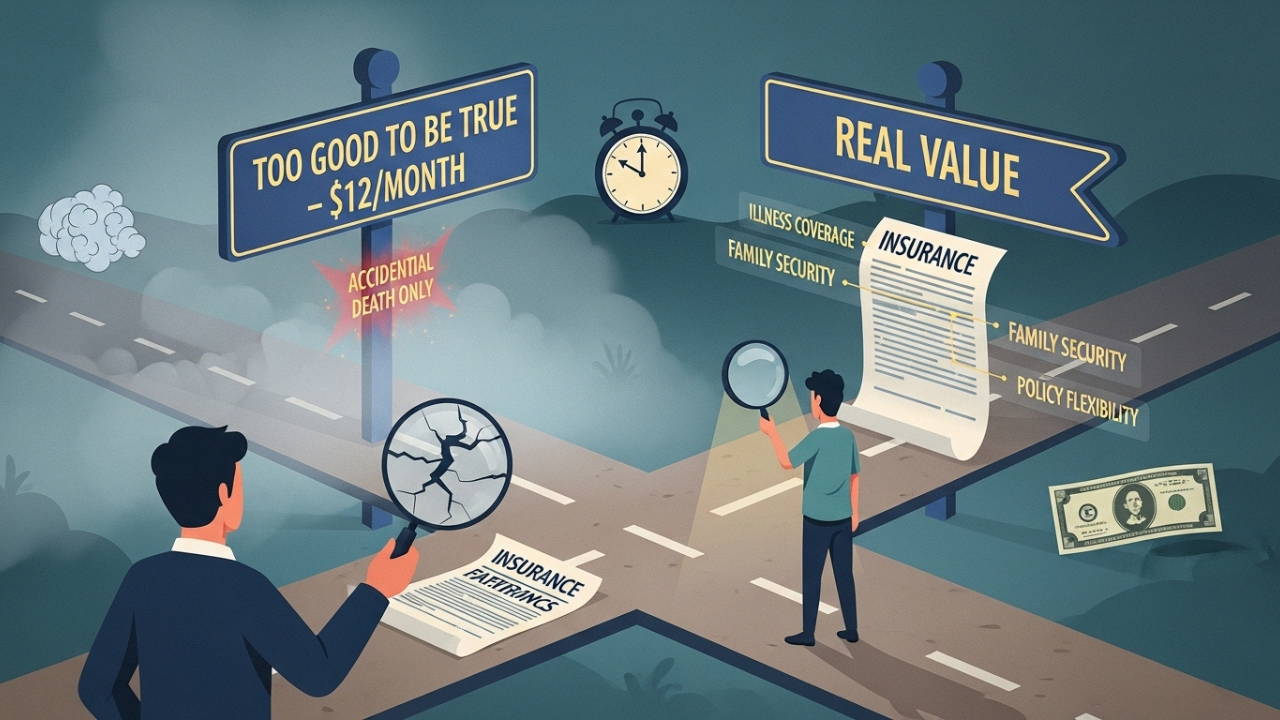Navigating the world of life insurance felt like stepping into a complex life maze for me. An accident here and a friend’s unexpected illness there made me aware of how fragile life truly is. Perhaps you are my friend who is hustling with work and family or starting a new chapter in life and wondering, like I did, How to choose the best life insurance policy.
Join me on this journey where we won’t refer to ourselves as agents or financial experts, but rather friends seeking answers together. I will share with you every important step, question, and lesson I encountered in this journey.
Key Takeaways
- While you don’t need to be wealthy to obtain life insurance, you absolutely need to be strategic.
- Life insurance is not solely focused on death; it also secures the living family’s future.
- The most expensive policy is not necessarily the best one.
- The “best” policy is the one that is tailored to your lifestyle.
- Knowing the difference between term and whole life insurance policies is more important than memorizing terminology associated with them.
- It is advisable to revisit an insurance policy frequently; such documents should not be treated as “set and forget” contracts.
The First Question: Why Are You Buying Life Insurance?
The most common mistake is asking the question of “the best company” or “cost.” While these are reasonable questions, they should not come first. The actual, primary question to ask is Why, as in why do you intend to purchase life insurance.
In my case, it was the idea that if something unfortunate happened to me, I wanted to ensure that my parents and sister would be financially secure. Over time that “why” changed. I got married, bought a house, and we talked about starting a family. My Responsibilities increased along with my coverage needs.
Perhaps for some other people it is different. Perhaps it is to ensure their children can get a college education without financial constraints. Maybe a person has elderly parents, or a mortgage which they do not wish to transfer onto a spouse. The point is: the why will dictate the remainder of the journey, steering all the subsequent decisions from here on out.
Understanding the Real Difference Between Term and Whole Life Insurance
Insurance, whole life, universal life, and term insurance are words people often hear of. To some, it might be a form of intellectual chatter to agree and Google it later. In simpler terms, you’re not wrong.
Term insurance is more like renting out a coverage policy. During the 10-30 years period, insurance companies offer fixed monthly/yearly premiums, which during that timeline, grants your family unconditional access to a payout should something happen to you. After this policy is ended, you receive nothing in return or any form of money built up over time.
In contrast, whole life insurance offers more value but at a increased price. Portion of the high premium pays towards different forms of back-end discounts-“cash value” which can be borrowed against or used as in the near future.
So how do you choose? Ask yourself this question: Do you want affordable, no-frills protection (term)? Or would you prefer something that offers protection for your whole life, whilst accumulating money slowly (whole)?
Think in Terms of Who You’re Protecting
The topic of death isn’t exactly something that is brought up on a daily basis. So let’s be real; life insurance is focusing on the aftermath, and that is where the benefit to life insurance comes in. That’s why it helps to picture the people you’re trying to protect.
If you have kids, think of how long they’ll need your earning potential. Would your spouse be able to afford to retain the marital residence? How about daycare? Groceries? Braces? Birthdays? Maybe you don’t have a family yet, but you’ve got a financial obligation that your parents cosigned on, or a sibling that’s going off to college. Whoever your people are, imagine their lives without your income and that’s your guide.
How Much Coverage Is “Enough”?
This is the challenging portion. Some will advise you to take ten times your annual salary, others will advise you to base it off your debt. I believe both can be true, but neither is complete.
This is how I worked it out. I wrote down my financial commitments. Mortgage. Vehicle financing. Credit cards. Then I calculated what I cared about in the future. Education funds for my kids, emergency funds for my spouse, even several years worth of groceries and utility payments. I envisioned providing them certainty and stability in life without my presence.
Then I put together what I had. Some savings, other investments, maybe a work group insurance policy. From the total, I subtracted what was available. What remained was my desired coverage gap.
That final number might be different for you. And that is perfectly fine. The goal is not to provide an accurate guess. Rather, provide sufficient protection.
Choosing an insurer isn’t like going to your favorite burger place. Good advertising doesn’t cut it. You need reassurance that there will be assistance if the worst case scenario comes true.
I analyzed customer service metrics. Review sites from past claimants. Their financial ratings. Their future outlook. If an insurer has no intention of sticking around for the long term, it matters.
Be careful with aggressive agents or sites that attempt to upsell far beyond your actual needs. A competent business will not stress you out; they’ll assist and enlighten. That’s how you identify a match.
Story from My Friend Jamie: When It Was Too Late
This story is hard to share, but it’s important.
My friend Jamie died at 37 in a tragic car accident. He was married and had two young children. Not long before, he had thought about purchasing a life insurance policy and got a quote, but figured he would “circle back to it.” In the end, all his family found was a life void of policy, savings, or any means to access financial support.
Heartbreaking does not encompass the reality. With Jamie’s passing, his wife selling their house, and his parents, now in their 60s, rejoining the workforce— all to help raise the boys, is just a fraction. And, the sad part is I could not stop thinking how different life would have been had he made that purchase.
Please don’t wait.
Don’t Be Fooled by Cheap Prices Alone
I remember an ad that offered 500,000 worth of coverage 12 a month. Sounds amazing right? But the fine print revealed that it only paid out for accidental death. You would not get a dime for illness. You would not get a dime for natural death. It was a bet on life, not insurance.
Cheap prices are always tempting, but ask yourself what are you truly paying for? If it sounds unbelievable, then it most definitely is.
Instead, shift your focus towards value. What do you exactly get for a certain amount? Does it increase later on? What other policies can you switch to if your needs change? Get answers that make sense to you.
How Your Health and Age Affect Your Options
As for me, my application for a policy required me to go through a brief health exam. A nurse had to come to my apartment and check my blood pressure, weight, and take a blood sample. It felt uncomfortable for the first few moments, but I understood the reason behind it. Every Insurance company wants to know what level of risk they are insuring.
If you are younger and healthy, the likelihood of having low premiums is high. That is the reason why getting coverage early on is a smart decision even if you feel you don’t need it.
After all, if you have some health difficulties, that does not mean you are limited. Options Are Available. This might take a bit more , but what you will be getting is still better than procrastinating.
Add-Ons You Might Not Think About
Ok, let’s be realistic now, life insurances do not operate with a one policy fits all mentality. You can purchase some policies that allow you to append stuff known as riders, treat them as bonus additions. To give you an example, I put on a rider called “waiver-of-premium.” In case I get disabled or unable to work, I do not have to pay the premiums. And that makes your mind easy. Alongside that you can also get additional coverages for a spouse, children or even higher payouts for death by accident.
While these additional riders will increase your premium, in case it is addressing an issue you truly care for, then perhaps it is rational for it. The explaining of each rider is crucial so just submit endless queries until you are satisfied.
Don’t Forget to Check (and Update) Your Policy
As mentioned before, get married, have kids, buy a second house or the saddest, divorce. All of these incidents require changing or updating your insurance policy.
That is why I set a calendar reminder for myself every year to review my policy. Coverage constraints, beneficiary relevance, and any debts or new responsibilities are some of the questions to analyze during the review.
Rather than stagnating, take charge of the living document and work it to your benefit. A document that is alive is adaptable and can produce desired outcomes.
You Are Not Alone in This
As easy as this may be to say it, my plea is that this does not turn into an extended procrastination for you. Once you get past the internal dialogue, everything else just falls into place.
During my sessions with an advisor, I was relatively on edge because I envisioned getting attacked by complicated phrases alongside sales tactics to push over-priced products. To my surprise, the discussion was deeply human. It felt like I was talking to a person and not a robot programmed to respond. Like myself, they also cared and valued my experiences. They guided my understanding of policies, what if scenarios, and so forth. That is what everyone deserves at the end of the day.
For people who dislike paperwork or phone calls, look for advisors that offer phone applications or online tools. Every day it is getting easier thanks to technology.
How to Choose the Best Life Insurance Policy That Fits Your Unique Life
Policy options vary greatly from one person to another, which is why you need to dedicate your efforts toward finding the best one. It is a challenge finding a balance between dread and trust when it comes to paying every month for the insurance policy.
Self-reflection can be helpful in decision-making. What coverage does this policy offer relative to my insurance needs?
- Will I comfortably be able to pay the premiums now and in the near future?
- How will my change in health impact the policy terms?
- What is the process for filing a claim, and how seamless is it?
- In the event of changes in my life, how responsive would the company and policy be?
If you focus on the questions mentioned above, narrowing down options and working toward finding the “best” policy becomes much easier.
Real-Life Story: How I Helped My Sister Find Peace of Mind
Let’s take a closer look at my sister Lisa. Her concern had been finding insurance coverage that dealt with the critical illness policy. She, just like everyone else, was completely lost with the diverse range of options available to her as well as their respective costs. Together we listed her priorities in a notebook, and from there I assisted her in comparing some policies. One policy featured a term life policy which, at a reasonable price, covered her children’s future educational expenses and could later be converted to a whole life policy.
That initial signing made her feel quite a bit lighter. While it was not ideal, it represented progress, which she intends to build on during future revisions as her family expands.
Lisa’s case illustrates how the life insurance selection process revolves around taking action and not focusing on flawless details.
Why Waiting Could Cost You More
I wish someone told me years ago that life insurance policies become more expensive with time. To put it another way, life insurance becomes more and more expensive as age increases.
Insurance companies view life insurance as a risk which accumulates as you age. The purchasing of policies can be done during the ages of twenty to thirty which saves foremost money in the long run.
Facing decisions head on normally provides comfort to the individual making the decision as it offers closure. However, delaying a decision offers no comfort and is devoid of the feeling of peace.
What Happens When You File a Claim?
No one desires to think about death, but, in case of unfortunate events when a loved one dies, it is critical to ensure the filing process goes as smoothly as possible. In such cases, good insurance companies attempt a step by step approach guiding families through collecting necessary documents like death certificates to get prompt claims.
I understand there are policies where, for various reasons, payouts are significantly delayed potentially extending to months or even years. Such policies mean that the family can expect slow responses at best and hope for the worst. Insurances needs to aid their clients in the payout process and help them understand complex insurance documents rather than ignore them.
This glues the importance of the reputation of an insurance company which, alongside the policy itself, is equally important. People require speedy access to funds which makes trust very hard to obtain when dealing with such claim policies.
How to Use Online Tools and Resources Without Getting Overwhelmed
Countless websites offer instant quotes, information, comparison tools, and advice. Accessing all this information can be helpful, however, it can also lead to an overload of information and options.
As for my suggestion? Online tools should be regarded as the first step of a process and not the final answer. First, obtain quotes to gain an understanding of price ranges. Use comparison sites to grasp the differences. However, after that, streamline your options and seek personalized assistance.
When I tried to do everything by myself, I got stuck. Consulting with an actual person—an agent or advisor—cleared the fog of options and allowed me to make confident decisions.
How to Avoid Common Pitfalls When Choosing Life Insurance
Avoid These Mistakes When Choosing a Life Insurance Policy There are certain repeating mistakes individuals often make when purchasing insurance, some of which I personally encountered.
First, don’t rely solely on emotion. It’s easy to feel scared or pressured, however, taking time to review everything is essential. If something feels off, ask questions or simply walk away.
Second, the fine print is usually the most crucial part, so make sure you do not skip it. Conditions such as waiting periods or exclusions will not be obvious and could catch you by surprise later on.
Finally, life insurance is not something to have on autopilot. Your life will change over time and your coverage should change too.
The Importance of Beneficiary Designations
Who they will name as beneficiaries is one detail that trips up many people. This is the person (or people) who will receive the payout.
It reminded me of a case I tried to help out in the past where a cousin of mine named his ex-wife as a beneficiary by mistake because he had never bothered to update his policy following their divorce. When he died, it became a monumental disaster.
Make sure that you have spoken to them so that they know what to expect and do talk about setting the right policies structure so they know what to expect. From time to time, make sure that you check and update your beneficiaries so that your finances will be directed to the appropriate individuals.
My Opinion| How to Choose the Best Life Insurance Policy with Confidence
I hope that my story will aid you as you unwind the issues and also the lessons that I have shared will assist you in your life. This process begins by understanding that finding the best policy does not mean picking out the shiniest or the cheapest options available. Understanding your needs and what family requires is a priority and that will provide peace of mind.
A good starting point will be your “why”, followed by diligent research and soliciting sound guidance and you shall be able to get a policy which is suitable and beneficial for you and your loved ones not just for today, but for many years ahead.
Life insurance is not simply a financial product, but rather a promise—a safety net intricately woven for our loved ones.
Friend, put an end to procrastination today. Your family and future self will appreciate the decision.






























Leave a Reply